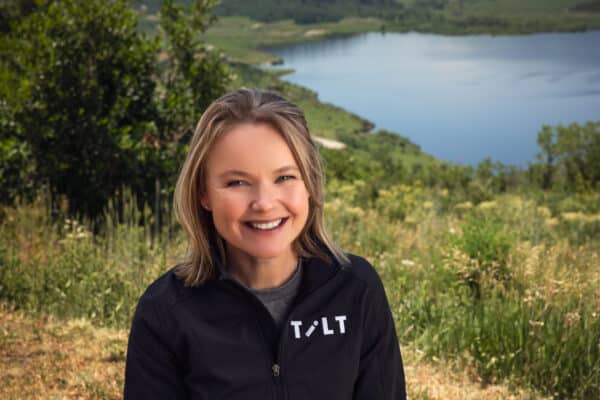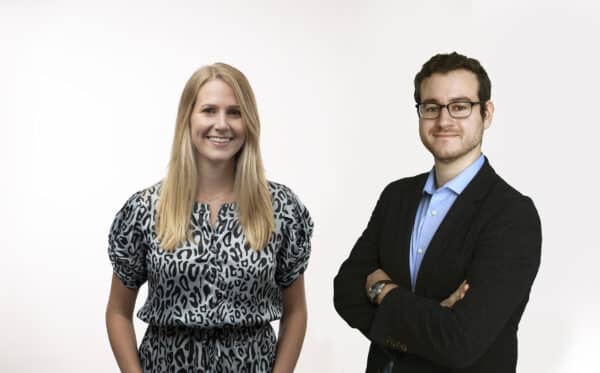Colorado startup funding increased sharply in September.
According to a tally of Form Ds filed with the SEC last month, 27 startups around the state raised a total of $431 million, compared to September 2020’s $124 million. It was also a steep jump from August 2021’s $67.5 million. (You can see our sortable spreadsheet here.)
BusinessDen defines a startup as a business that’s less than 10 years old and excludes publicly traded companies, real estate ventures and funds.
Startups outside of Boulder and Denver raised the most with $299 million among 16 deals. Denver businesses followed with $132 million among 11 deals. There were no startups in Boulder with recorded capital raises last month.
Here are some highlights from September:
Tilt: $7.4 million
When Jennifer Henderson first got pregnant while working, she said she was taken out of a position of leadership ahead of her impending leave.
Years later at a different company when she was pregnant with her second child, a promotion she was set to receive was rescinded.
“That was enough for me, and I left a very comfortable job and a comfortable paycheck and ran into the world of entrepreneurship, knowing nothing,” Henderson said. “I just knew that I was pissed off. I did speak with counsel, but that came with a gag order, so my story would essentially evaporate, which is something I wasn’t willing to do. It was a short-term gain, but long-term nothing was going to change.”
In 2017, Henderson founded Tilt. Tilt, which stands for Talent in Leave Technology, offers software that streamlines the leave-of-absence process for employers and their employees with customized leave plans. It also helps managers understand how to communicate with their employees throughout the process, plan for the period of time when the employee is on leave and set a target return date.
Companies can sign an annual contract for Tilt’s software, which Henderson launched in 2019, based on employee population size. About 65 companies have, she said.
“Because I sat in corporate America as long as I did, I was really engrained that this should be a B2B solution and not a B2C because I didn’t feel that parents or people going through disability or COVID leave should incur a cost component,” Henderson said. “And I knew enough of the inner workings, of operations and budgets that an organization or employer has a lot more latitude to be able to provide this as a benefit.”
Last month, the Fort Collins-based startup closed on a $5 million capital round led by California-based Firework Ventures with participation from existing investors, such as Denver-based Rockies Venture Club, Matchstick Ventures and the Sofia Fund.
Henderson said the company plans to use the funds to grow its product team, build out its sales function and scale the business overall. Tilt currently has 26 remote employees, and she hopes to double the team over the next year.
Tilt went through the Techstars Workforce Development Accelerator earlier this year.
NextHealth Technologies: $3 million
Denver-based NextHealth Technologies aims to save health insurers money by steering customers toward more cost-effective treatment. The startup, founded in 2013, raised $3 million last month from six investors, according to SEC filings.
NextHealth, led by Eric Grossman, sells its services to health insurers looking to retain customers that spend less on health care and to save money on customers that spend the most on health care. The startup reminds consumers to take pills on time, get a flu shot, stay in-network or avoid the emergency room when an appointment with a general practitioner would do.
To date, the startup has raised a total of $29.6 million, according to SEC filings.
Health care clients sign an annual contract for NextHealth’s software, with fees varying on a per-user, per-month basis. Insurers also can hire NextHealth to manage their nudges. For that service, the startup calculates how much an insurer has saved by using NextHealth and charges a commission up to 20 percent.
Cabinet (Join Cabinet, Inc.): $2.6 million
Julia Leibowitz started her career as an executive assistant in the venture capital industry, and over time her responsibilities grew from scheduling trips to marketing, financial reporting and planning events.
“I was surprised to find that there was no software out there to help assistants, especially with the heavily administrative part, like scheduling and travel, to be more efficient and drive productivity to their teams,” Leibowitz said.
While studying for her MBA at Cornell, she met an engineer named Evan Kesten, and they started Cabinet in 2018.
Cabinet began as an online community connecting executive assistants and allowing them to share advice and insider tips. This year, the founders launched software for assistants with scheduling tools that automates the calendar process, a task management program that turns emails and messages into tasks on a to-do list, and personal information storage for their clients.
The Denver-based startup has over 4,000 executive assistants using its services, and has grown 30 percent over the last six months, Leibowitz said.
“Scheduling is the bane of everyone’s existence, but as you can imagine, it’s far more challenging for executive assistants who are often managing multiple calendars and have very little context behind the meetings,” Leibowitz said. “We wanted to provide assistants the software and the context to be able to schedule meetings faster and more strategically.”
In September, Cabinet raised $2.6 million through a funding round led by New York-based Harlem Capital with participation from Denver-based Service Provider Capital, Parade Ventures and Good Friends venture firm. The co-founders plan to use the funds to grow its team of three and invest in sales and marketing.
Halfdays Apparel: $1.5 million

Halfdays co-founders, from left, Ariana Ferwerda, Karelle Golda and Kiley McKinnon. (Photos courtesy of Halfdays)
Denver-based Halfdays Apparel raised $1.5 million in a funding round led by San Francisco-based Precursor Ventures with participation from The Fund Rockies.
The local female skiwear brand was co-founded last year by CEO Ariana Ferwerda, Olympic skier Kiley McKinnon and Karelle Golda, who is based in San Francisco and previously helped Serena Williams launch her clothing brand.
Halfdays’ items include the “Lawrence Jacket,” a fitted jacket with hidden pockets and attached hand warmers that retails for $345, and the “Alessandra Pant,” tailored pants designed with an adjustable Velcro strap that retail for $215. The company also offers a belted version of the jacket, as well as a mock-neck long-sleeve top and leggings.
The products are currently not available for purchase, but will be come November, when the company adds three new offerings.
“Sales in the first season were great. We definitely met our expectations if not exceeded them,” Ferwerda said. “At the end of the summer, we only had a bit of inventory left over from last year, so we pulled all of it off our site to prepare for the larger launch in the first week of November.”
Halfdays has an office in RiNo’s Taxi by Zeppelin building and plans to use the funds to scale its staff and marketing efforts. The startup has seven full-time employees and plans to add three to five more over the next year.
Halfdays skiwear is only available on the company’s website, but the company said it will announce retailer partnerships in the next couple months.
Colorado startup funding increased sharply in September.
According to a tally of Form Ds filed with the SEC last month, 27 startups around the state raised a total of $431 million, compared to September 2020’s $124 million. It was also a steep jump from August 2021’s $67.5 million. (You can see our sortable spreadsheet here.)
BusinessDen defines a startup as a business that’s less than 10 years old and excludes publicly traded companies, real estate ventures and funds.
Startups outside of Boulder and Denver raised the most with $299 million among 16 deals. Denver businesses followed with $132 million among 11 deals. There were no startups in Boulder with recorded capital raises last month.
Here are some highlights from September:
Tilt: $7.4 million
When Jennifer Henderson first got pregnant while working, she said she was taken out of a position of leadership ahead of her impending leave.
Years later at a different company when she was pregnant with her second child, a promotion she was set to receive was rescinded.
“That was enough for me, and I left a very comfortable job and a comfortable paycheck and ran into the world of entrepreneurship, knowing nothing,” Henderson said. “I just knew that I was pissed off. I did speak with counsel, but that came with a gag order, so my story would essentially evaporate, which is something I wasn’t willing to do. It was a short-term gain, but long-term nothing was going to change.”
In 2017, Henderson founded Tilt. Tilt, which stands for Talent in Leave Technology, offers software that streamlines the leave-of-absence process for employers and their employees with customized leave plans. It also helps managers understand how to communicate with their employees throughout the process, plan for the period of time when the employee is on leave and set a target return date.
Companies can sign an annual contract for Tilt’s software, which Henderson launched in 2019, based on employee population size. About 65 companies have, she said.
“Because I sat in corporate America as long as I did, I was really engrained that this should be a B2B solution and not a B2C because I didn’t feel that parents or people going through disability or COVID leave should incur a cost component,” Henderson said. “And I knew enough of the inner workings, of operations and budgets that an organization or employer has a lot more latitude to be able to provide this as a benefit.”
Last month, the Fort Collins-based startup closed on a $5 million capital round led by California-based Firework Ventures with participation from existing investors, such as Denver-based Rockies Venture Club, Matchstick Ventures and the Sofia Fund.
Henderson said the company plans to use the funds to grow its product team, build out its sales function and scale the business overall. Tilt currently has 26 remote employees, and she hopes to double the team over the next year.
Tilt went through the Techstars Workforce Development Accelerator earlier this year.
NextHealth Technologies: $3 million
Denver-based NextHealth Technologies aims to save health insurers money by steering customers toward more cost-effective treatment. The startup, founded in 2013, raised $3 million last month from six investors, according to SEC filings.
NextHealth, led by Eric Grossman, sells its services to health insurers looking to retain customers that spend less on health care and to save money on customers that spend the most on health care. The startup reminds consumers to take pills on time, get a flu shot, stay in-network or avoid the emergency room when an appointment with a general practitioner would do.
To date, the startup has raised a total of $29.6 million, according to SEC filings.
Health care clients sign an annual contract for NextHealth’s software, with fees varying on a per-user, per-month basis. Insurers also can hire NextHealth to manage their nudges. For that service, the startup calculates how much an insurer has saved by using NextHealth and charges a commission up to 20 percent.
Cabinet (Join Cabinet, Inc.): $2.6 million
Julia Leibowitz started her career as an executive assistant in the venture capital industry, and over time her responsibilities grew from scheduling trips to marketing, financial reporting and planning events.
“I was surprised to find that there was no software out there to help assistants, especially with the heavily administrative part, like scheduling and travel, to be more efficient and drive productivity to their teams,” Leibowitz said.
While studying for her MBA at Cornell, she met an engineer named Evan Kesten, and they started Cabinet in 2018.
Cabinet began as an online community connecting executive assistants and allowing them to share advice and insider tips. This year, the founders launched software for assistants with scheduling tools that automates the calendar process, a task management program that turns emails and messages into tasks on a to-do list, and personal information storage for their clients.
The Denver-based startup has over 4,000 executive assistants using its services, and has grown 30 percent over the last six months, Leibowitz said.
“Scheduling is the bane of everyone’s existence, but as you can imagine, it’s far more challenging for executive assistants who are often managing multiple calendars and have very little context behind the meetings,” Leibowitz said. “We wanted to provide assistants the software and the context to be able to schedule meetings faster and more strategically.”
In September, Cabinet raised $2.6 million through a funding round led by New York-based Harlem Capital with participation from Denver-based Service Provider Capital, Parade Ventures and Good Friends venture firm. The co-founders plan to use the funds to grow its team of three and invest in sales and marketing.
Halfdays Apparel: $1.5 million

Halfdays co-founders, from left, Ariana Ferwerda, Karelle Golda and Kiley McKinnon. (Photos courtesy of Halfdays)
Denver-based Halfdays Apparel raised $1.5 million in a funding round led by San Francisco-based Precursor Ventures with participation from The Fund Rockies.
The local female skiwear brand was co-founded last year by CEO Ariana Ferwerda, Olympic skier Kiley McKinnon and Karelle Golda, who is based in San Francisco and previously helped Serena Williams launch her clothing brand.
Halfdays’ items include the “Lawrence Jacket,” a fitted jacket with hidden pockets and attached hand warmers that retails for $345, and the “Alessandra Pant,” tailored pants designed with an adjustable Velcro strap that retail for $215. The company also offers a belted version of the jacket, as well as a mock-neck long-sleeve top and leggings.
The products are currently not available for purchase, but will be come November, when the company adds three new offerings.
“Sales in the first season were great. We definitely met our expectations if not exceeded them,” Ferwerda said. “At the end of the summer, we only had a bit of inventory left over from last year, so we pulled all of it off our site to prepare for the larger launch in the first week of November.”
Halfdays has an office in RiNo’s Taxi by Zeppelin building and plans to use the funds to scale its staff and marketing efforts. The startup has seven full-time employees and plans to add three to five more over the next year.
Halfdays skiwear is only available on the company’s website, but the company said it will announce retailer partnerships in the next couple months.


